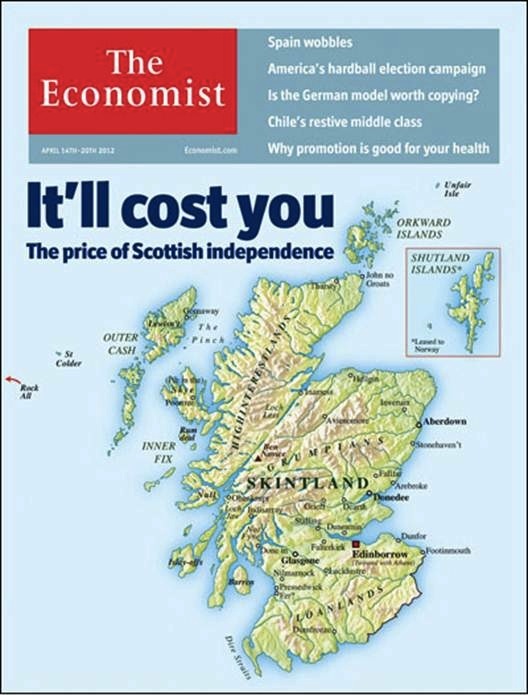The Economist has some fun with Scotland this week, running a cover suggesting my motherland would go bust if it was independent. The map has lots of gags: the Outer Hebrides is renamed ‘Outer Cash’, ‘Edinborrow’ twinned with Athens etc. But it suffers from one central defect: the thesis is nonsense. Saying that Scotland would go bust without English subsidy is the clichéd unionist attack line, which has lost force over the decades because it is demonstrably untrue. The emergence of new nation states, many much smaller than Scotland, has shown it that small is viable (something that wasn’t as evident in the 1970s) and even the Economists’ own story has data showing Scotland as the third most prosperous part of the UK, in terms of economic output per head. This rather makes a mockery of The Economist’s cover. Strip out London, and it’s richer than England. Add a slice of the oil, and would Scotland go bust? Of course not, and unionists like myself have learned to stop suggesting otherwise.
As Alex Salmond rightly points out, Britain is hardly in surplus right now — for every £6 Osborne spends, he has to scrounge £1 from the international debt markets. UK net debt is rising for the foreseeable, Osborne’s crystal ball now stretches to April 2017 and the pesky deficit is still there. So now is not a good time for London politicians to say that a country which can’t balance its books is not a viable country. The UK has not balanced its books for ten years now, and probably won’t for most of this decade. Here is how the picture looks for the last few years, varying depending on whether you allocate Scotland a percapita share of the oil, or a geographical share of the oil…


PS: As CoffeeHousers point out, the actual Economist article does not substantiate its ‘Skintland’ cover — and, in places, directly contradicts it. Even without oil, the latest figures show Scotland’s tax revenue was £42.2bn in 2009-10, about 40 per cent of its economic output. Can you have a viable, non ‘skint’ nation at that level of tax? Ask Canada, Spain, Australia, New Zealand, Turkey and the US — all of whose governments get by on collecting less tax, as a share of GDP, than Scotland does. An independent Scotland would mean a smaller state, but a bankrupt one? If Salmond could have designed his own Economist cover, that would have been the one — it perfectly conforms to his own image of a “sneering” London political class.







Comments